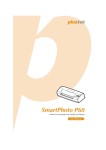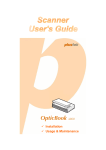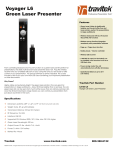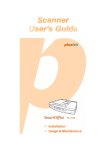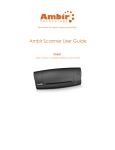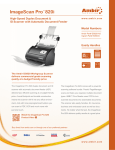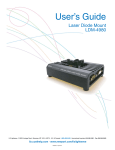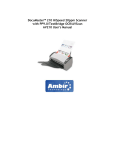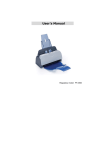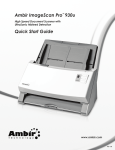Download Ambir ImageScan Pro 820i User`s guide
Transcript
Trademarks ©2011 Ambir Technology, Inc. All rights are reserved. All trademarks and brand names mentioned in this publication are property of their respective owners. ImageScan Pro 820i User's Guide Ambir_Ver 1.3.doc Liability While all efforts have been made to ensure the accuracy of all contents in this manual, we assume no liability for errors or omissions or by statements of any kind in this manual, whether such errors are omissions or statements resulting from negligence, accidents, or any other cause. The contents of this manual are subject to change without notice. We will not bear any legal liability if users fail to follow the operation instructions in this manual. Copyright The scanning of certain documents, e.g. checks, bank notes, I.D. cards, government bonds, or public documents, may be prohibited by law and/or subject to criminal prosecution. Please be responsible and respectful of intellectual property and copyright laws when scanning books, magazines, journals and other materials. Environmental Information Ambir Technology is committed to the environment. This product is designed and produced to achieve sustainable environmental improvement. We strive to produce products in compliance with global environmental standards. Please consult your local authorities for proper disposal. Our product packaging is recyclable. Screen Examples in This Manual The screen shots in this guide were made with Windows XP. If you are using Windows 7, Vista or 2000, your screen may look somewhat different but functionality is not affected. 2 Table of Contents INTRODUCTION ................................................................................................................................... 5 HOW TO USE THIS GUIDE ................................................................................................................................ 5 GUIDE CONVENTIONS ..................................................................................................................................... 5 A Note About Icons ............................................................................................................................... 6 SAFETY PRECAUTIONS ..................................................................................................................................... 6 MINIMUM SYSTEM REQUIREMENTS ................................................................................................................... 7 BOX CONTENTS.............................................................................................................................................. 8 SCANNER FEATURES ........................................................................................................................................ 9 CHAPTER I. INSTALLING THE SCANNER ................................................................................................11 SOFTWARE INSTALLATION REQUIREMENTS ........................................................................................................ 11 HARDWARE REQUIREMENTS ........................................................................................................................... 11 SCANNER INSTALLATION AND SET UP ............................................................................................................... 12 Step 1. Connecting the Scanner to Your Computer............................................................................ 12 Step 2. Installing the Software........................................................................................................... 13 Step 3. Installing the Extended Paper Width Slider ........................................................................... 15 Step 4. Installing the Stacker ............................................................................................................. 15 INSTALLING ADDITIONAL SOFTWARE ................................................................................................................ 15 CHAPTER II. SCANNING ......................................................................................................................17 PREPARING DOCUMENTS ............................................................................................................................... 18 Checking Document Conditions .......................................................................................................... 18 Loosening Documents......................................................................................................................... 19 LOADING DOCUMENTS .................................................................................................................................. 20 LOADING BUSINESS CARDS ............................................................................................................................. 21 LOADING PLASTIC CARDS ............................................................................................................................... 21 SCANNING DOCUMENTS ................................................................................................................................ 22 Scanning via TWAIN Interface ............................................................................................................ 22 Scanning from the Scanner’s Front Panel ........................................................................................... 24 Scan from the Scanner Buttons .......................................................................................................... 24 Configure Button Settings .................................................................................................................. 25 View Button Settings .......................................................................................................................... 25 Scanning from the On-screen AmbirScan ADF Execute Menu ............................................................ 25 CHAPTER III. CARE AND MAINTENANCE ..............................................................................................27 CLEANING THE SCANNER ................................................................................................................................ 27 Cleaning Materials.............................................................................................................................. 27 Cleaning the ADF ................................................................................................................................ 28 REPLACING CONSUMABLES ............................................................................................................................ 30 Replacing the Pad Module .................................................................................................................. 30 CALIBRATING THE SCANNER............................................................................................................................ 31 3 POWER SAVE ............................................................................................................................................... 32 CHAPTER IV. TROUBLESHOOTING .......................................................................................................33 SCANNER CONNECTION ................................................................................................................................. 33 CLEARING PAPER JAMS .................................................................................................................................. 33 APPENDIX A: SPECIFICATIONS .............................................................................................................35 APPENDIX B: CUSTOMER SERVICE AND WARRANTY ............................................................................36 TECHNICAL SUPPORT..................................................................................................................................... 36 Free Support Through Email & Web ................................................................................................... 36 Technical Support by Telephone ......................................................................................................... 36 PRODUCT WARRANTY INFORMATION ............................................................................................................... 36 Warranty for Products ........................................................................................................................ 37 Extent of Warranty ............................................................................................................................. 37 Items Not Covered by the Warranty ................................................................................................... 37 FCC RADIO FREQUENCY STATEMENT ............................................................................................................... 38 4 INTRODUCTION Thank you for purchasing an Ambir scanner. We have designed this product to provide you with an effective tool to capture, manage, and archive documents of many types. We encourage you to read this important User’s Guide carefully. How to Use This Guide This User’s Guide provides instructions and illustrations on how to install and operate your scanner. This guide assumes the user is familiar with Microsoft Windows 2000 Professional/ XP/ Vista/ 7. The Introduction section of this manual describes the box contents and minimum system requirements to use this scanner. Before you install your scanner, check the box contents to make sure all parts are included. If any items are damaged or missing, please contact the point of purchase. Chapter I describes how to install scanner’s software and connect the scanner to your computer. Note: The scanner connects to your computer through a Universal Serial Bus (USB). If your computer does not support USB technology, you will need to purchase a USB interface card to add USB capabilities to your computer, or buy and install USB connectors if your motherboard has USB capabilities. This guide assumes that your computer is USB-ready and has a free USB port. Chapter II describes how to use your scanner. Chapter III describes how to maintain and clean your scanner. Chapter IV contains technical support information that can help you solve simple problems. Appendix A contains the specifications of the scanner you purchased. Appendix B contains our customer service, the limited warranty agreement and FCC statement concerning the product. Guide Conventions Bold – Represents commands or contents on your computer screen. ALL CAPS – Important note or first use of an important term in a chapter. Italic – Represents buttons on your scanner OR important notes. 5 A Note About Icons This guide uses the following icons to point out information that deserves special attention. Warning A procedure that must be followed carefully to prevent injury, or accidents. Attention Instructions that are important to remember and may prevent mistakes. Optional tips for your reference. Information Safety Precautions Warning Before using this device, please read the following important information to eliminate or reduce any possibility of causing damage and personal injury. 1. The product is for indoor use in dry locations. Condensation may occur inside this device and cause malfunction if the following conditions are met: when the device is moved directly from a cold to a warm location; after a cold room is heated; when this device is placed in a damp room. To avoid condensation: i. Seal this device in a plastic bag for it to adapt to room conditions. ii. Wait for 1-2 hours before removing this device from the bag. 2. Use the AC adapter and USB cable provided with the scanner. Use of other AC adapters and cables may lead to malfunction. 3. Keep the space around the AC adapter clear in case you need to quickly unplug the AC adapter during an emergency. 4. A damaged wire could cause fire or electrical shock. Keep the power cord straight and avoid placement where it could lie twisted or bent. 6 5. Unplug this device if you don’t need to use it for an extended period of time to avoid any risks of causing a fire. 6. Do not attempt to disassemble the scanner. There is danger of electric shock. Opening your scanner will void your warranty. 7. Be sure not to bump or knock the scanner glass as it is fragile and could break. 8. Do not subject the scanner to excessive vibration. It may damage the internal components. Minimum System Requirements1 ® PC with Pentium II processor (Pentium III processor recommended) 1GB RAM or higher Available USB 2.0 port CD-ROM Drive or DVD-ROM Drive 800 MB Free Hard Disk Space Video card that supports 16-bit (high) color or greater Operating System: Windows 7, Vista, Windows XP Home, Windows XP Professional, Windows 2000 Higher requirements may be needed when scanning or editing large quantities of images. The system requirements stated are only a guideline, generally the better the computer (motherboard, processor, hard disk, RAM, video graphic card), the better the results. 1 7 Box Contents2 1. Scanner 2. USB Cable 3. AC Adapter 4. Stacker 5. Quick Start Guide 6. Setup/Application CD-ROM 7. Calibration Sheet 8. Memo Label 9. Extended Paper Width Slider (2 pieces) 10. Padded Carry Bag (Not included with all scanner models) 11. Cleaning Cloth 12. Pad Module (Not included with all scanner models) 2 Save the box and packing materials in case you need to transport the scanner in the future. 8 Scanner Features 1. PAPER CHUTE COVER—Helps keep the paper in place. Open paper chute cover when using the scanner. 2. PAPER WIDTH SLIDER—Adjusts the paper width slider for the paper size you are using. 2. Extended Paper Width Slider (accessory in the box contents) – Holds the paper upright to avoid crooked paper feeding. Information 3. COVER LEVER—Opens the ADF cover. Pull it to open the ADF cover when you need to clear paper jam or clean the scanner. 4. STACKER—Keeps paper in place. Extend it in case of longer paper. 5. ADF (AUTOMATIC DOCUMENT FEEDER)—Automatically feeds a stack of documents for scanning. 6. SIDE GUIDE—Holds paper in place while being fed through the ADF. Pull side guides out to hold the paper. 7. PAPER CHUTE EXTENSION—Extends to hold longer paper. 9 8. UP BUTTON—Press to move forward the scanning task number indicated in the function number display. 9. DOWN BUTTON—Press to move backward the scanning task number indicated in the function number display. 10. FUNCTION NUMBER DISPLAY— Indicates the number of the predefined scanning task selected by the up or down button. 11. SCAN BUTTON—Press to perform a predefined scanning task selected by the up or down button. 12. POWER LED—Indicates scanner status. Light Status Green Scanner is turned on and ready to scan images Orange Scanner in standby mode (sleep mode) if idle for 10 minutes Off Scanner is off, either because the power is not on or the AC adapter is not properly plugged into an AC power outlet. 13. HANDLE— Ergonomically designed for you to carry the scanner with ease. 14. USB PORT—Connects the scanner to a USB port on your computer via the included USB cable. 15. POWER RECEPTOR—Connects the scanner to a standard AC power outlet via the included AC adapter. 16. POWER SWITCH—Use this to turn the scanner ON or OFF. 10 CHAPTER I. INSTALLING THE SCANNER Before installing your scanner, please verify that you have all of the proper components. A list of the package contents is provided in the ―Box Contents‖ section of this guide. Software Installation Requirements Your scanner comes with the following software: Scanner driver and button management software (AmbirScan ADF), OCR software (ABBYY FineReader 9.0), Document management software (NewSoft Presto! PageManager). These software applications use approximately 400 megabytes of hard disk space after they are installed into your computer. To ensure ample room for the installation, as well as for scanning and saving images, a minimum of one (1) GB of hard disk space is recommended. This USB scanner only works with Microsoft Windows 7/Vista/ XP/2000 operating systems. Hardware Requirements This scanner connects to your computer through the Universal Serial Bus (USB) which supports HOT PLUG AND PLAY. To determine whether your computer is USB-capable, you must check the rear of your PC to locate a USB jack that looks like the picture below. If you are having trouble locating the USB port on your computer, please refer to the hardware manual that came with your computer. Upon examination, you should find one or two rectangular USB ports, which usually appear as shown below. USB Connector(s) 11 Scanner Installation and Set Up Place your scanner on a smooth, level and solid surface before going through the installation process. Attention Tilted or uneven surfaces may cause paper feeding errors, scanner damage or personal injury. Avoid using the scanner in a dusty environment. Dust particles and other foreign objects may damage the unit. Step 1. Connecting the Scanner to Your Computer Attention Please make sure the scanner is turned OFF before you plug or unplug the scanner power adapter. 1. Plug the AC adapter into the scanner’s power receptor. 2. Plug the other end of the AC adapter into a standard AC power outlet. 12 3. Plug the square end of the included USB cable into the USB port the rear of the scanner. at 4. Plug the rectangular end of the USB cable into an available USB port on your computer. 5. If you plan to connect your scanner to a USB hub3, make sure the hub is connected to the USB port in your computer. Next, connect the scanner to the USB hub. Step 2. Installing the Software 1. Switch on the scanner power from the rear of the scanner. 2. If the USB components on your computer are functioning correctly, they will automatically detect the scanner causing the Add New Hardware Wizard or Found New Hardware Wizard to launch. Information If your computer is off when the scanner is connected, the ―Add New Hardware Wizard‖ message will not be displayed until the computer is on and Windows starts. 3. For Windows 7: a. When the Setup/Application CD is for several scanner models: i. Insert the Setup/Application CD-ROM, included with your scanner, into your CD-ROM drive. Click Run install.exe in the AutoPlay window. ii. Click on the Yes button if the User Account Control dialog pops up. Follow the instructions in the pop-up installation message. iii. In the Device Manager window, right-click on this scanner under Other devices and select Update Driver Software from the pop-up menu. Click Browse my computer for driver software in the window that appears, and click the Browse button. iv. In the Browse For Folder window, select the folder or the CDROM drive that contains this scanner’s driver and click the OK button to return to the previous screen. Click the Next button and click Install this driver software anyway if the Windows Security window appears. Please skip to step 8. b. When the Setup/Application CD is for one scanner model i. Insert the Setup/Application CD-ROM, included with your scanner, into your CD-ROM drive. Click Run install.exe in the AutoPlay window. ii. Click on the Yes button if the User Account Control dialog pops up. If the pop-up wizard window appears click Next, and click Install this driver software anyway in the Windows 3 A USB hub is not included with the scanner. 13 Security window then click Finish in the wizard window. Please skip to step 8. 4. For Windows Vista: a. Select ―Locate and install driver software (recommended)‖ when the ―Found New Hardware‖ window is displayed. b. Click the Continue button when the ―User Account Control‖ dialog pops up. c. Insert the Setup/Application CD-ROM, included with your scanner, into your CD-ROM drive when the system prompts you ―Insert the disc that came with your USB Scanner―, and click on the [Next] button. Please skip to step 7. 5. For Windows XP: a. Insert the Setup/Application CD-ROM, included with your scanner, into your CD-ROM drive. b. Select Install the software automatically (recommended) and click the Next button. c. Click the Next button in the window that appears. 6. During the installation process the message ―Windows can’t verify the publisher of this driver software‖ might appear. Click Install this driver software anyway to continue the installation. 7. When the system completes the installation, click the Finish button. 8. Follow the on-screen instructions to install all the software your new scanner requires. 9. After you install the software, close all open applications and click the Finish button to restart your computer. 10. After the computer restarts, you will be prompted to calibrate the scanner. 11. Insert the special calibration sheet into the scanner’s document feeder, with arrows toward the scanner buttons. 12. Follow the on-screen instructions to complete the scanner calibration. After calibration is complete, click OK and then click Finish. Information If scanner installation doesn’t start automatically, click Start, select Run and type in D:\Install (where D: is the drive letter assigned to your computer’s CD-ROM drive). 14 Step 3. Installing the Extended Paper Width Slider 1. Open the ADF cover by pulling the gray lever, and get the right and left extended paper width sliders ready. 2. Align and insert the left extended paper width slider onto the paper width slider on the left. Position and insert the right extended paper width slider onto the paper width slider on the right. 3. Close the ADF cover by pushing it back down until it snaps back into place. Step 4. Installing the Stacker Stacker installation is optional. Information Insert the tabs on the stacker into their slots on the scanner. Installing Additional Software 15 Your scanner is TWAIN compliant and functions with virtually all available TWAIN compatible software. If you purchase additional software to use with your scanner, please make sure it conforms to the TWAIN standard. 16 CHAPTER II. SCANNING Your scanner needs to be driven by certain type of software program. Since all documents or images (whether text or pictures) that are acquired from the scanner are treated by your computer as images, most scanning will probably be done from an image-editing program where you can view, edit, save and output the scanned images. An image-editing program has been bundled for your scanner on the included Setup/Application CD-ROM. It will allow you to alter and correct any scanned images by using a variety of filters, tools and effects. What about scanning text documents and editing them in a word processor? This is the role of Optical Character Recognition (OCR) software. OCR software converts the image files that are created from scanning text documents into text files that can be viewed, edited and saved by word processors. ABBYY FineReader 9.0, an OCR program, has also been bundled on the included Setup/Application CD-ROM, and if you wish to use the scanner in this way you should install this software. The AmbirScan ADF program seamlessly integrating the operation of your scanner with your computer and other peripherals, provides a quick and convenient way to perform various scanning functions. With AmbirScan ADF, you don't need to adjust settings every time you scan. Simply press any button on the scanner's front panel or click any scanning menu item of AmbirScan ADF on the screen. The scanner starts to scan your paper documents and transfer them to your assigned destination. The destination can be a printer, your E-mail program, files on your disk drives, an imageediting program, etc. This chapter describes three important steps of scanner operation. Read them thoroughly and follow the instructions to ensure correct use and optimal scanner performance. Step 1. Preparing Documents Step 2. Loading Documents, Loading Business Cards, Loading Plastic Cards Step 3. Scanning Documents 17 Preparing Documents Proper document preparation prior to the scan can prevent paper feed errors and damage to the scanner. Checking Document Conditions Make sure the size and ream weight of your documents meet the requirements stated in Appendix A. Refer to ―Appendix A: Specifications‖ of this guide for more information. Scanning multiple documents in a batch using the ADF can increase your work efficiency and make large scanning tasks easier. The ADF accepts a variety of paper and stationery you may use in your daily work or personal life, such as: Normal paper whose size and ream weight meet the requirements stated in ―Appendix A: Specifications‖ of this guide. Notched paper Coated paper (e.g., brochure) Attention To prevent paper feeding errors and damage to the ADF unit, strictly follow the instructions below: Remove all small objects (e.g. paper clips, pins, staples or any other attached fasteners before loading the paper into the ADF. Make sure paper is completely flat with no creased or curled corners Avoid scanning documents with pencil lead and newspaper clippings as they will make the ADF exposure glass and the inner ADF dirty. If you have to scan such paper, clean the scanner frequently (refer to ―Chapter III. Care and Maintenance‖ of this guide for more information). The paper for each batch scanned by ADF can be of the same or different weights. However, make sure the length of each scan batch is the same. Don’t use the ADF to scan documents if they meet any of the following conditions: Paper lighter that 14 lb. (50 g/m2) or heavier that 28 lb. (105 g/m2) Paper with clips or staples attached Paper with inconsistent thicknesses (e.g. envelopes) Paper with wrinkles, curls, folds or tears 18 Paper with an odd shape (non-rectangular) Tracing paper Carbon paper, pressure sensitive paper, carbonless paper Items other than paper (e.g. cloth, metal, foil) Attention DO NOT use the ADF to scan photographic sheets or particularly valuable document originals; feeding errors may cause wrinkles and/or tearing. DO NOT place paper with wet ink or correction fluid into the ADF. Wait a few minutes for it to get dry. Loosening Documents Before loading documents into the ADF, loosen them as follows: 1. Fan the documents so that no two pages are sticking together. 2. Hold the documents upside down with both hands, and then gently push them onto a flat surface to align the edges of all documents. This will allow documents to feed into the ADF one at a time and reduce paper-feeding errors. 19 Loading Documents 1. Load the documents, headfirst and face down, toward the center of the ADF paper chute and all the way into the ADF until touching the bottom. For single-sided scans, load the documents face down so that the side to be scanned faces towards the paper chute. For double-sided scans, load the desired page order of documents face down so that the side to be scanned faces towards the paper chute. 2. To scan longer documents, unfold the paper chute extension and side guide to provide further support for the documents. 3. Adjust the paper width slider for the paper size you are using. The paper width slider should be gently touching both sides of the documents. 20 Attention DO NOT load more than 50 sheets of paper (18 lb./70 g/m2,) into the ADF. Paper fed into the ADF must be a minimum of 2‖ x 2‖ (5.08 x 5.08 cm, W x L). Make sure there are no gaps between the document stack and the paper-width slider; otherwise, the scanned images may be skewed. Although the documents should be loaded firmly in place to ensure optimum scanning accuracy, they should never be wedged in so tightly that the process of feeding them through the scanner is strained. DO NOT load additional paper into the ADF while the unit is feeding and scanning. Loading Business Cards 1. Load the business cards, headfirst and face down, toward the center of the ADF and all the way into the ADF until touching the bottom. For single-sided scans, load the business cards face down. For double-sided scans, load the business cards in the desired order. 2. Adjust the paper width slider to the business card width. The paper width slider should be gently touching both sides of the business cards. Loading Plastic Cards Attention Make sure the plastic cards you wish to scan are loaded horizontally into the ADF. Max. thickness of each plastic card is 0.76 mm (ISO 7810 STANDARD), embossed card is 1.2 mm. 1. Plastic cards can be embossed credit cards, driver licenses, ID cards, insurance cards, Medicare cards or any membership card. Make sure to load the embossed side of the embossed card face down into the scanner. Load the plastic card horizontally, headfirst and face down, toward the center of the ADF. For single-sided scans, load the card face down. 21 For double-sided scans, load the card in the desired order. 2. Adjust the paper width slider to the card width. The paper width slider should be gently touching both sides of the card. Scanning Documents There are three different ways to operate the scanner: 1. By acquiring images from the scanner through our TWAIN interface within any TWAIN-compliant application programs. 2. By scanning from the buttons on the scanner front panel. 3. By scanning from AmbirScan ADF Execute menu on the screen. Before you start scanning, check the following: Attention Both your computer and scanner are turned on. The icon appears on the Windows system tray. Paper is appropriately loaded into the ADF. Scanning via TWAIN Interface The TWAIN program is a very important piece of software that comes with your scanner. This program acts as an interface between the scanner hardware and the image-editing software you use to view and edit images. It allows you to adjust a number of settings to define the quality of the scanned image. The following sections describe how to use the bundled document management software application (Presto! PageManager 7) to scan via the TWAIN interface. You may also use other TWAIN compatible scanning applications to do your scanning projects. Select the Scan Source: 22 If you have more than one scanner or other imaging devices installed on your computer, you need to set this scanner as the default scanning source before you acquire image data/scan using a TWAIN compliant program. 1. For Presto! PageManager 7.1, From the File menu, click Select Source… 2. In the window that opens, choose this scanner and then click the OK button to set this scanner as the default scanning source. Scan within NewSoft Presto! PageManager 7.1: 1. Click on the Windows Start button, point to All Programs > Presto! PageManager 7.1 and then click Presto! PageManager 7.1 to launch the PageManager program. 2. Within Presto! PageManager, click Tools > Scan Settings > uncheck ―Suppress TWAIN User Interface‖ > OK. Click File > Acquire Image Data. 3. In the TWAIN window that opens, select ADF (Front Side) as the Scan Type if you want to scan single-sided documents, or select ADF (Duplex) to scan double-sided documents. 4. Adjust the scanning settings. For ADF (Duplex) scan, you can tailor settings individually for front and rear sides of the documents. Click Front Side button to adjust the scanning settings of document front side and then click Rear Side button to adjust the scanning settings of document rear side. You can enable the Merge Pages function only when you select ADF (Duplex) as Scan type and Automatic Size as Page Size to output the scan images of both front and rear sides in one image. After Merge Pages is enabled, you can select Horizontally to generate both front and rear image data horizontally in a joined image (the rear image will be placed at the right side next to the front image), or make the selection of Vertically to generate both front and rear image data vertically in a joined image (the rear image will be placed below the front image). 5. Load one page of the document and click the Preview button. The scanned image should appear in the Preview Window. To define the margins and crop out sections of the image you don’t want scanned, use the mouse to click and drag the corners or sides of the scan area borders. Adjust the scan settings again if the preview image doesn’t satisfy your needs. 6. Load all pages of the document and click the Scan button. 7. When the scan finishes, click the Exit button to close the TWAIN window. The scanned images are displayed in Presto! PageManager, and you may perform the image editing tasks. 23 If you usually scan images with the same settings, you can define a scan profile to save the settings you have configured by entering a name or description for this new profile in the white area beside the word Profile and then click the Save button. Information Whenever you want to scan similar documents and apply the same settings, you can just select this profile from the drop-down list and click the Scan button. Click the Help button within the TWAIN window for more information about the settings. Scanning from the Scanner’s Front Panel Completing your scanning projects using the scanner buttons is easy and convenient. The number assigned to a scanning task displayed on the scanner’s front panel is configured through AmbirScan ADF. AmbirScan ADF offers you quick access to the most frequently-used scanning functions. They are especially useful when you need to repeatedly scan with the same settings and send images to the same destination. Before performing your first scan via scanner buttons, first configure the button settings with your preferences. Scan from the Scanner Buttons 1. Place the document or images onto the scanner. (Refer to CHAPTER II. Scanning‖ of the Scanner User’s Guide for more information in placing paper into the ADF properly.) 2. Check current button settings by viewing the memo sticker or the Button Configuration window. If needed, you may also modify settings to meet your current needs. (Refer to ―View Button Settings‖ and ―Configure Button Settings‖ below for more information.) 3. Press the UP or DOWN button to select the desired task. 4. Press the Scan button. The scanner starts to scan immediately, carrying out the corresponding action according to settings in the Button Configuration window. Only scan text documents with the OCR setting. Do not scan a photo using the OCR button. Attention 24 Configure Button Settings Within the ―Button Configuration‖ window, you can find a row of icons running through the left side of the window. Each icon represents a scanning task, and the number underneath corresponds to the function number displayed on the scanner front panel. Nine frequently-used scanning tasks are pre-configured for your convenience. You may, however, customize the settings of the nine tasks to best meet your preferences. Follow the steps described below: 1. Do one of the following to open the Button Configuration window: •Double-click the icon in the Windows system tray. • Right-click the icon in the Windows system tray, and then choose Button Configuration… in the pop-up menu that opens. 2. Select a task number by clicking on the icon. 3. Select the desired function from the drop-down list of Button Template and adjust button settings. Information You may use the memo sticker included in the box to write customized button number settings. Click the Help button within the Button Configuration window for more information about the settings. View Button Settings There are three ways to view the button settings: • Double-click the icon in the Windows system tray. •Right-click the icon in the Windows system tray, and then choose Button Configuration… in the pop-up menu that opens. • Look at your memo sticker if you wrote down the customized button number settings on it. Scanning from the On-screen AmbirScan ADF Execute Menu You may also use AmbirScan ADF’s on-screen Execute menu to perform the same scanning tasks. The AmbirScan ADF program provides a quick and convenient way to perform various scanning functions. Follow the steps below: 1. Place the document or images onto the scanner. 25 2. Check current button settings by viewing the memo sticker or the Button Configuration window. If needed, you may also modify settings to meet your current needs. 3. Right-click the icon in the Windows system tray, and then choose Execute in the pop-up menu that opens. 4. Click the desired button function item in the pop-up menu. The scanner starts to scan immediately and carries out the corresponding action according to the Button Configuration you set. 26 CHAPTER III. CARE AND MAINTENANCE Your scanner is designed to be maintenance-free. However, routine care and maintenance can keep your scanner working smoothly. Cleaning the Scanner Paper powder, dust, ink and toner from paper being scanned may make the inner document feeder dirty, which leads to poor image quality or document-feeding errors. How often you clean your scanner depends on the type of paper and number of pages being scanned. Perform the following procedures to clean the scanner surface and the ADF unit. Gently wipe locations described herein. Do not rub too hard. Warning Before cleaning the scanner, turn off the scanner and disconnect the power cable and USB cable, and wait a few minutes for the glass and/or the inner ADF to cool to ambient temperature. Wash your hands with soap and water after cleaning the scanner. Cleaning Materials Have the following cleaning materials ready to clean the scanner: soft, dry, lint-free cloth (or a cotton swab) non-abrasive cleaner—Isopropyl alcohol (95%). DO NOT use water. Attention Alternatively you can use glass cleaner or neutral detergent to clean the scanner glass. DO NOT use either products to clean the ADF feed roller or pad module. Use of other cleaning materials could damage your scanner. 27 Cleaning the ADF 1. Open the ADF cover by pulling the gray lever. Cover lever ADF cover 2. Gently wipe the following areas with the cloth dampened with the cleaner. Be careful not to scratch their surfaces. Clean Feed Roller: Wipe the Feed Roller from side to side and then rotate it. Repeat until its entire surface is cleaned. Clean Pad Module: Wipe the Pad Module from top to bottom (in the direction of arrow shown in below picture). Be careful not to damage the pick springs of the pad. 28 Clean ADF Glass: Attention Do not spray cleaner directly onto the scanner glass. Excess liquid residue may fog or damage the scanner. 3. Wait for cleaned areas to dry completely. 4. Close the ADF cover by pushing it back down until it snaps back into place. 29 Replacing Consumables As a guideline, we recommend replacing the pad module every 20,000 scans. Replacing the Pad Module 1. Open the ADF cover by pulling the cover lever. Cover lever ADF cover 2. Remove the pad module by squeezing the black tabs on both sides of the pad module and pulling it out. 3. Install the new pad module by inserting the tabs on the module into their slots on the scanner. 4. Close the ADF cover by pushing it back down until it snaps back into place. 30 Calibrating the Scanner Please uninstall the extended paper width sliders before you start the calibration. Attention Calibrate the scanner if colors appear in areas that should be white, or colors of the scanned image and the original vary a lot. This allows you to adjust and compensate for variations that can occur in the optical component over time. Follow the steps below to calibrate the scanner: 1. Locate the Calibration Sheet, marked with an arrow on either edge at both sides. It is used specifically for ADF Scanning calibration. 2. Insert the special calibration sheet into the ADF of the scanner, with an arrow toward the scanner buttons. Attention 3. Please insert the special calibration sheet included with the scanner. Alternatively you may also use any plain white sheet of paper sized in A4 (216 x 297 mm) instead; however, the calibration effect may be less beneficial than with the special calibration sheet. Click Start > All Programs > Your scanner model name > Calibration Wizard. 31 4. Click Next in the Calibration Wizard that pops up and then click Calibrate Now.... 5. Click the Start button to begin the calibration process. Calibration is complete when the scanner pulls the sheet all the way through. After the calibration is complete, click OK and then click Finish. Power Save To save power, the scanner light source always automatically turns itself off after the scanning process is finished. If you won’t be using your scanner for a long period of time, shut it down and then disconnect the power cable from the power outlet. Information The scanner will enter standby mode (sleep mode) after it is idle for 10 minutes. Simply press any scanner button on the scanner panel and the scanner will revert to the normal status. From the Windows START menu, point to All Programs > Your Scanner Model Name, and then click Scanner Utility. Refer to the Scanner Utility online help to learn more about standby mode. 32 CHAPTER IV. TROUBLESHOOTING If you encounter problems with your scanner, please review the installation and scanning instructions contained in this guide. Before you seek customer service or repair assistance, please refer to the information in this chapter and consult our FAQ (Frequently Asked Questions) for useful troubleshooting information. From the Windows START menu, point to All Programs > Your Scanner Model Name, and then click FAQ. Scanner Connection The first step to take when troubleshooting connection problems with your scanner is to check all physical connections. The icon, located in the Windows system tray, indicates if the scanner software is properly launched and the scanner and computer are communicating with each other. Appearance Status The program has been successfully launched and the scanner is connected with the computer, ready to scan images. The scanner is not connected with the computer or the scanner power is not switched on. No Display You have chosen to terminate the program, whether the scanner is connected or disconnected with the computer. Clearing Paper Jams 1. Remove any jammed documents still loaded into the ADF. 2. Open the ADF cover by pulling the cover lever. 3. Gently but firmly pull the jammed documents out of the ADF. Try to avoid creasing or wrinkling the documents. 33 Attention 4. Do not try to pull jammed or half-scanned documents out of the ADF without first opening the ADF cover. Doing so may permanently damage the ADF. Close the ADF cover by pushing it back down until it snaps back into place. 34 APPENDIX A: SPECIFICATIONS4 Ambir ImageScan Pro 820i Optical Resolution Max. Hardware Resolution 600 dpi 600 x 600 dpi Color: Input 48-bit; Output 24-bit Scan Modes Grayscale: Input 16-bit; Output 8-bit Black & White: 1-bit Technology Color Contact Image Sensor (CIS) 1. 50 sheets (A4/Letter, 18 lb. or 70 g/m2), maximum thickness under 0.2‖ (5mm). ADF Capacity 2. 20 sheets (Business Cards) 3. Plastic Card, maximum thickness under 1.2 mm. Note: Maximum ADF capacity varies, depending upon paper weight. 8 ppm/ 8 ipm (200 dpi, Color mode, A4 Portrait) 25 ppm/ 50 ipm (200 dpi, Grayscale mode, A4 Portrait) ADF Scanning Speed 25 ppm/ 50 ipm (200 dpi, Black & White mode, A4 Portrait) Note: Results may vary depending upon your scanning application, computer processor and system memory. Scan Area Maximum 8.5‖ x 14‖ (216 x 356 mm) (W x L) Minimum 0.52‖ x 0.52‖ (13.2 x 13.2 mm) Acceptable Paper Sizes Maximum 8.66‖ x 14‖ (220 x 356 mm) (W x L) Minimum 2‖ x 2‖ (50.8 x 50.8 mm) Acceptable Paper 14 to 28 lb (50 to 105 g/m2) Weight for ADF Power Adapter Power Consumption Operation: < 18 W Standby (sleep mode): < 0.5 W Off Mode: < 0.3 W Interface USB 2.0 High Speed Operating Temperature 41F to 104F (5C to 40C) Relative Humidity 20% to 80% (non-condensing) Physical Dimensions Without Stacker (WxDxH) 263 x 127.5 x 148 mm (10.36‖ x 5.02‖ x 5.83‖) Weight 4 24Vdc, 0.75 A Without Stacker: 3.66 lb. (1.66 kg) With Stacker: 3.96 lb. (1.8 kg) Protocols TWAIN Compliant EMI FCC Class B, CE Hardware specifications may change at any time without prior notice. 35 APPENDIX B: CUSTOMER SERVICE AND WARRANTY For further assistance, visit our website or call our customer support number. One of our representatives will be happy to assist you Monday through Friday during office hours. To avoid delays, please have the following information ready before calling: Scanner name and model number Scanner serial number (Located on the back of the scanner) Scanner CD version and part number A detailed description of the problem Your current operating system Name of software package(s), version or release number and manufacturer of the software Other USB devices installed Technical Support Free Support Through Email & Web Visit Ambir’s website at www.ambir.com for online access to technical support information including: installation guides, FAQs, troubleshooting tips, and driver downloads. Contact email addresses and a chat feature are also available online for your convenience in reaching us should you need further assistance. Technical Support by Telephone Support is available from 7:00 a.m. – 7:00 p.m. Central Time Monday-Friday by dialing (630) 530-5400 or (800) 915-9930, option 3. For all Ambir scanners you can speak directly to a technical support representative or leave a message for a call back. You will be connected to a highly trained, friendly and professional support agent who will work with you to resolve your issue. For expediency when you call please be in front of your system with your software and documentation handy for troubleshooting. *We will make every effort to respond to telephone support calls within 1 business day. However, we strongly suggest that you make initial contact via email with an explanation of the problem you are experiencing and a callback number should we need to speak to you directly. Product Warranty Information Statement of Limited Warranty for the United States, Canada and European Economic Community: 36 Products – ImageScan Pro 820i Warranty Period – 1 year *Contact your place of purchase for warranty service information Warranty for Products Ambir Technology warrants our products against defects in materials and workmanship to the original purchaser for a period of one (1) year from the date of the original purchase. This warranty is limited to repair or replacement of the product, and the remedy provided to the purchaser for warranty service is the sole discretion of Ambir Technology. Extent of Warranty Any use of the product for a purpose in which it is not intended, and/or purchaser modifications, alterations, and/or repairs to the product, will constitute misuse and are not subject to the warranty. The warranty does not cover the repair or exchange of a product resulting from accident, unsuitable physical or operating environment, or failure caused by a product for which the Ambir is not responsible. Items Not Covered by the Warranty Host computer operating systems, application programs or hardware configurations are not covered. For customer service or further warranty information please email or call Ambir directly. Please provide product model name and number, place and date of purchase, your name, daytime telephone number and a description of the difficulty you are experiencing. You will normally receive a written email response or call-back within 1 business day. Ambir Technology 918 N. Oak Lawn Ave. Elmhurst, IL 60126 USA Toll Free: (800) 915-9930 Main Number: (630) 530-5400 Technical Support: (630) 530-5400 option 3 www.ambir.com 37 FCC Radio Frequency Statement This equipment has been tested and found to comply with the limits for a Class B digital device, pursuant to part 15 of the FCC rules. These limits are designed to provide reasonable protection against harmful interference in a residential installation. This equipment generates, uses and can radiate radio frequency energy and, if not installed and used in accordance with the instructions, may cause harmful interference to radio communications. However, there is no guarantee that interference will not occur in a particular television reception (which can be determined by turning the equipment off and on), the user is encouraged to try to correct the interference by one or more of the following measures: Reorient or relocate the receiving antenna. Increase the separation between the equipment and receiver. Connect the equipment to an outlet on a circuit different from that which the receiver is connected. Shielded interconnect cables and shielded power cord which are supplied with this equipment must be employed with this equipment to ensure compliance with the pertinent RF emission limits governing this device. Consult the dealer or an experienced radio/TV technician for help if the conditions persist. Changes or modifications not expressly approved by the manufacturer or authorized service center could void the user’s authority to operate this equipment. This device complies with Part 15 of the FCC Rules. Operation is subject to the following two conditions: (1) this device may not cause harmful interference, and (2) this device must accept any interference received, including interference that may cause undesired operation. 38






































